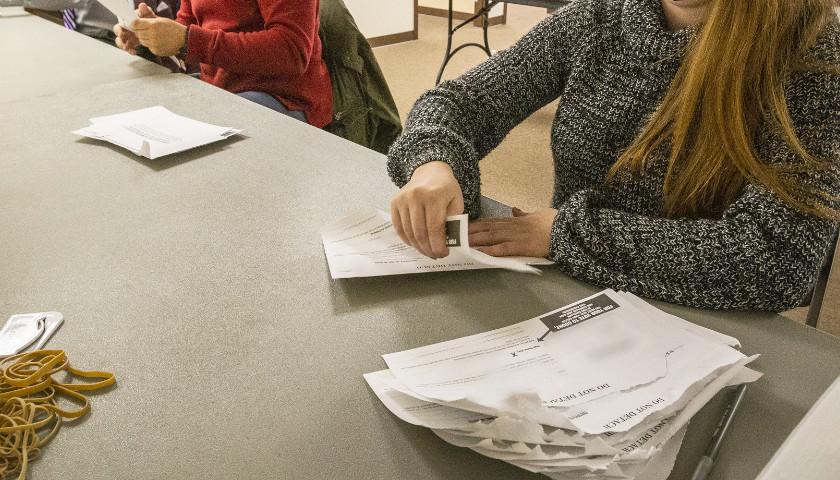Maricopa County failed to maintain chain-of-custody records for hundreds of thousands of early ballots dropped off at third-party contractor Runbeck Election Services, and a new report is out analyzing the extent of the illegal behavior, which is a class 2 misdemeanor. Election integrity organization Verity Vote issued its analysis last week.
The report observed that then-Secretary of State Katie Hobbs admonished Cochise County before the 2022 election about deviating from the state’s Election Procedures Manual. Yet “just one month later, Hobbs chose to disregard Maricopa County’s admitted deviations from the EPM and violations of law as she oversaw and certified her own election.” Verity Vote asserted that documents “long withheld” were finally produced, revealing the lack of chain of custody, and “Maricopa officials misled the court about the process and the records.”
In Hobbs’ October 22 letter to the Cochise County Supervisors, she said, “The County ‘has no discretion to deviate’ from the requirements ‘established by the Legislature and in the EPM,’ and any attempt by the Board to ‘circumvent the mandates of the EPM would be unlawful.’” Hobbs threatened to sue the county if they conducted a hand count of ballots.
A.R.S. 16-452 states that the EPM contains the rules governing elections. Section C of that statute provides, “A person who violates any rule adopted pursuant to this section is guilty of a class 2 misdemeanor.”
The lack of chain of custody for early ballots was a key issue in Kari Lake’s election contest lawsuit. She alleged that over 298,942 early ballots delivered to Runbeck did not have the required record.
Verity Vote’s report contains a lengthy list of ways Maricopa County failed to adhere to the EPM. First, the county failed to count and record the number of drop box ballots retrieved from each location on Election Day. During Lake’s trial, county officials admitted that they merely wrote down estimates instead. Maricopa County co-elections director Rey Valenzuela testified during Lake’s trial that they only counted the drop box ballots received before Election Day.
“On Election Day, no, because we’re not doing drop box courier process at that time. It’s a different process for Election Day,” he said.
The report saidd, “The fact that Maricopa followed the law prior to Election Day shows they were well aware of the legal requirements and that the County officials chose to disregard the law for Election Day drop box ballots.”
The report emphasized, “The legal requirement to count and record the precise number of early ballots retrieved from each individual drop box location on Election Day is repeated three times in the Elections Procedures Manual.” Two of them refer to the “central counting place,” which is the Maricopa County Tabulation and Election Center (MCTEC).
However, Maricopa County Recorder Stephen Richer testified that drop box ballots received on Election Day were counted at Runbeck, not at the county as required by law. “If you’re talking about early ballots that are dropped off on Election Day, those come and those all come to MCTEC first where they are gathered, and then they are transferred over to Runbeck where they are counted by our people at Runbeck because they have a high-speed counter,” he said.
Second, the report found that the county failed to track ballots dropped off at vote centers with the statutorily required inspection board log. In response to a public records request for the logs, the report asserted that the county “sent copies of the Incoming Scan Receipt forms which merely document the total number of ballots scanned with no record of the origin of the ballots.”
Third, the county transferred “an unknown number of ballots without documentation … by failing to count the number of ballots before loading them onto multiple trucks for transfer to Runbeck.” Runbeck employees merely recorded the number of trays they received, not the number of ballots, and “[t]hey lacked documentation to confirm that they were receiving the same number of trays that had been loaded onto the truck at MCTEC,” the report said.
A.R.S. 16-621(E) requires that a chain of custody be kept at the county; it does not mention Runbeck. It provides, “The county recorder or other officer in charge of elections shall maintain records that record the chain of custody for all election equipment and ballots during early voting through the completion of provisional voting tabulation.” The report asserted that this law was broken when uncounted ballots were transferred from MCTEC to Runbeck.
Due to the failure to keep a chain of custody, there was a discrepancy of over 84,000 ballots between the number of ballots received at Runbeck and the number of ballots scanned at Runbeck, the report said. Fifth, the county “failed to produce public records and misrepresented the existence of the records during the trial.” Only six months later was it revealed that the county had eliminated a chain of custody procedure and discovered the 84,000 ballots discrepancy.
Sixth, the report accused the county of incorrectly “reporting the quantity of Election Day drop box ballots to the public, the Secretary of State’s Office, and to the courts.” The county reported receiving 292,000 drop box ballots on Election Day, but newly produced records that were withheld revealed that there were only 253,000 ballots, a discrepancy of 38,672 ballots.
The report asserted that the county in its pleadings tried to confuse the issue of documenting chain of custody with the tasks of signature verification, removal of the ballot from the envelope, and tabulation, which is known as “Processing and Tabulating Early Ballots.” The report said the county also tried to confuse the processing of drop box ballots with USPS ballots, “by claiming they could substitute the USPS chain of custody requirements for drop box ballot chain of custody requirements.”
The report said both Valenzuela and Hobbs confused different chain-of-custody forms. Hobbs claimed, “Sorted ballots are loaded into trays in secure cages, and an estimate of ballots is derived based on the number of trays, consistent with the EPM’s requirements to count ballots upon their arrival at MCTEC.” However, Verity Vote said this was not “not true because these estimates were made at Runbeck.” Additionally, the estimate of ballots that Hobbs referred to documented 214,000 ballots — 84,000 short of the 298,000 ballots that were scanned at Runbeck.
When asked about the Inbound Receipt of Delivery form (IROD), Valenzuela referred to the “inbound scan,” but Verity Vote said the IROD form “does not include the ‘result of that scan.’”
The report accused Maricopa County Co-Director Scott Jarrett of falsely telling the court that all the Delivery Receipts showing chain of custody had been provided to the court. “Despite numerous efforts to obtain or inspect the Delivery Receipt documents — Maricopa obstructed and claimed that they had ‘misplaced’ the Delivery Receipts.” Not until June 2023, the report said, did the county allow inspection of the Delivery Receipts, and it was only “a portion of the photocopies.”
Finally, Verity Vote said the county gave conflicting information about how many drop box ballots were dropped off. The county “repeatedly claimed that they received approximately 290,000 drop box ballots on Election Day.” However, after the county finally turned over the previously withheld Delivery Receipts, they contradicted this number. Since the county certified the election results stating that 505,756 early ballots were returned at drop boxes, and “the county had already received 252,000 drop box ballots by November 7th — That left only 253,00 Early Ballots available for Election Day,” resulting in 38,000 unaccounted for.
The report quoted Richer stating twice that there were 290,000 drop box ballots on Election Day; once during the canvass presentation to the Maricopa County Supervisors providing the results, and under oath in the Lake case.
The report concluded, “The County’s testimony and documents prove that 84,000 ballots could have been added or removed without the County even noticing. Maricopa County avoided addressing the discrepancies that exist in their own documents during trial and still have not addressed them. They admittedly circumvented the mandates of the EPM without consequence.”
– – –
Rachel Alexander is a reporter at The Arizona Sun Times and The Star News Network. Follow Rachel on Twitter. Email tips to [email protected].





